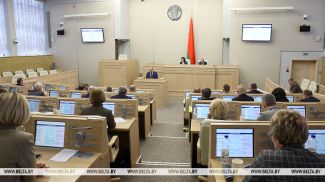MINSK, 17 June (BelTA) – The Healthcare Ministry has posted preliminary results of a sero-epidemiological study to assess COVID-19 herd immunity on its website. The study was conducted jointly with Russia's Federal Service for Surveillance on Consumer Rights Protection and Human Well-Being (Rospotrebnadzor), BelTA informs.
By 15 June, the researchers processed 99.6% of tests taken by the participants who had survived COVID-19 and 97.4% of tests taken by people who said in questionnaire that they had got the Sputnik V vaccine. Some 92% of participants who had received the vaccines developed post-vaccination antibodies.
27% of seropositive participants who developed post-infection antibodies indicated in the questionnaires that they had not had the coronavirus. This means that they may have experienced a mild or asymptomatic form of the disease.
“According to preliminary data, post-infection seropositivity to the virus stands at 38.4% and ranges from 34.1% in Minsk Oblast to 42.1% in Grodno Oblast,” the Healthcare Ministry said. For comparison: in different regions of Russia this figure ranges within 29-80%.
Thus, the preliminary COVID-19 herd immunity (immunity after infection and immunity after vaccination altogether) of the surveyed population is 47.4%, which is not enough to curb the active circulation of the virus. Therefore, according to the Healthcare Ministry, a lot depends on how the population will observe health and safety rules, including self-isolation, social distancing, and wearing masks. Mass vaccination against COVID-19 will also continue.
“These recommendations are particularly important given the risk of more contagious coronavirus variants entering Belarus. For example, the Delta variant that was first identified in India,” the Healthcare Ministry informed.













